外研版七年级下册Module 3 Making plans 模块复习课件(共48张PPT)
文档属性
| 名称 | 外研版七年级下册Module 3 Making plans 模块复习课件(共48张PPT) | 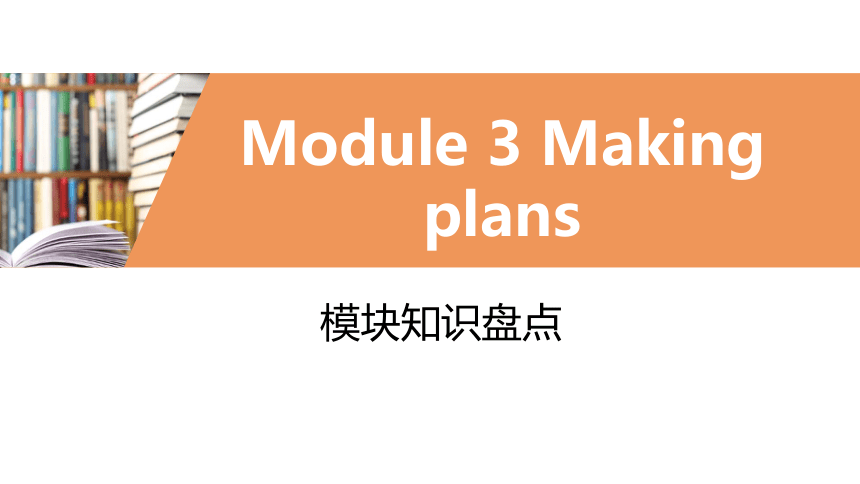 | |
| 格式 | pptx | ||
| 文件大小 | 326.2KB | ||
| 资源类型 | 教案 | ||
| 版本资源 | 外研版 | ||
| 科目 | 英语 | ||
| 更新时间 | 2022-08-27 21:44:47 | ||
图片预览

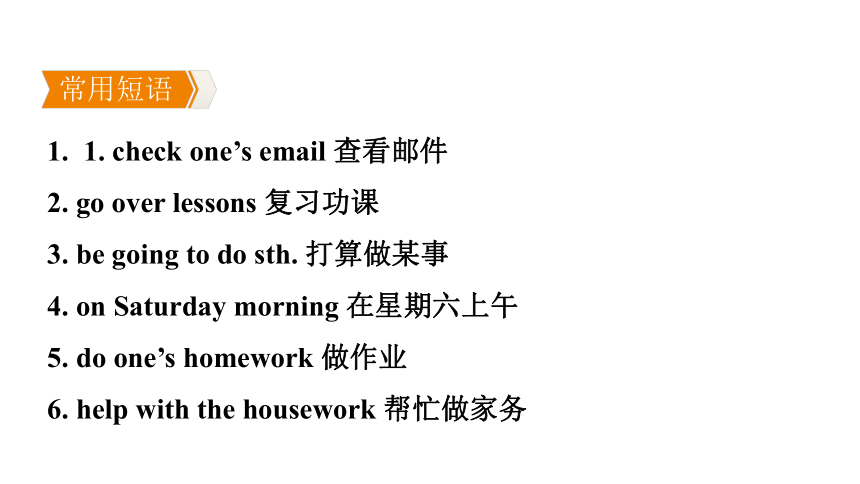

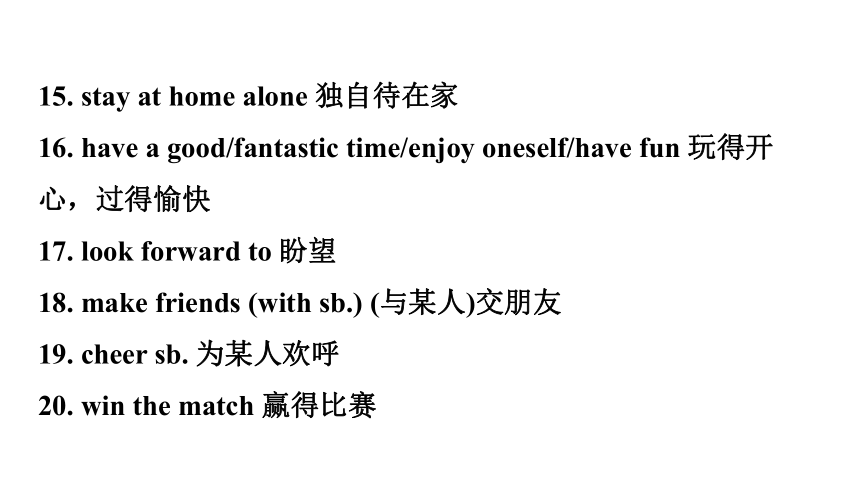


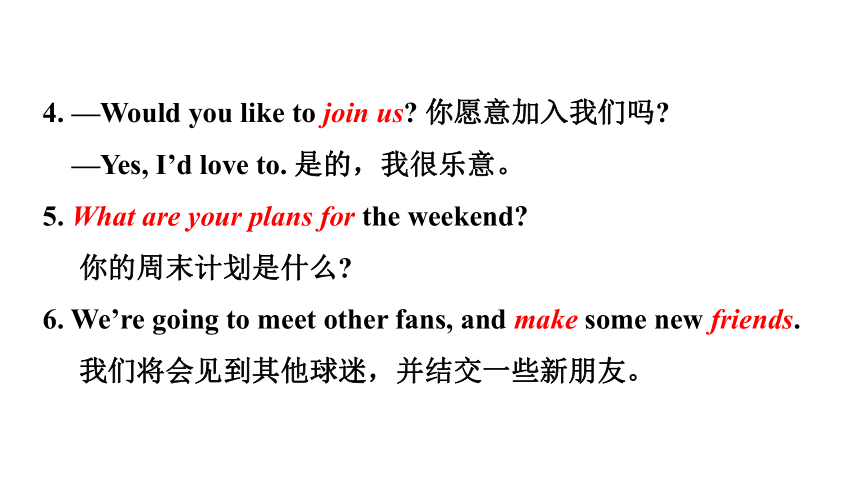
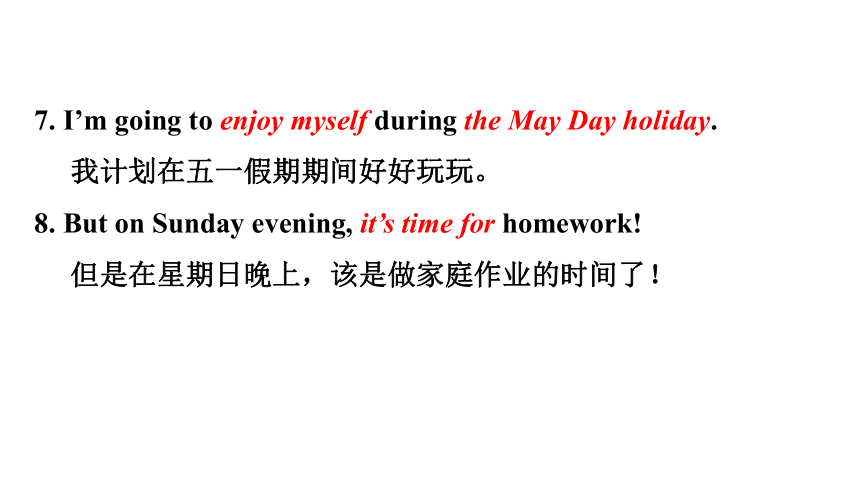
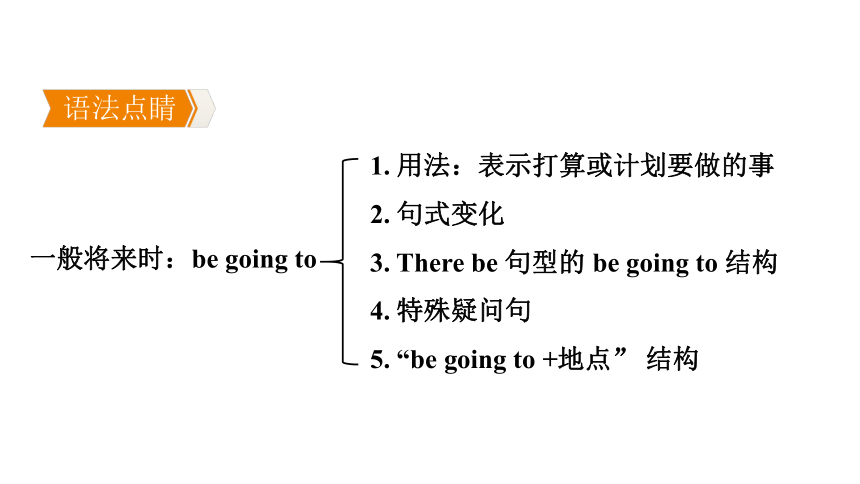
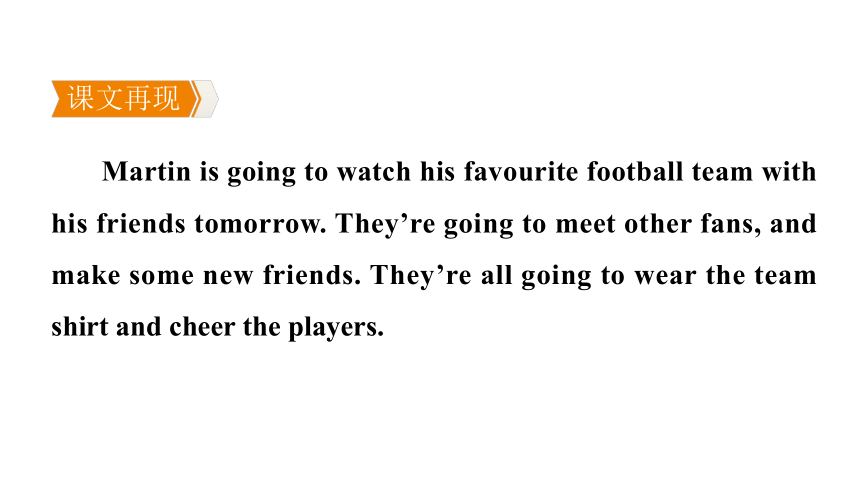
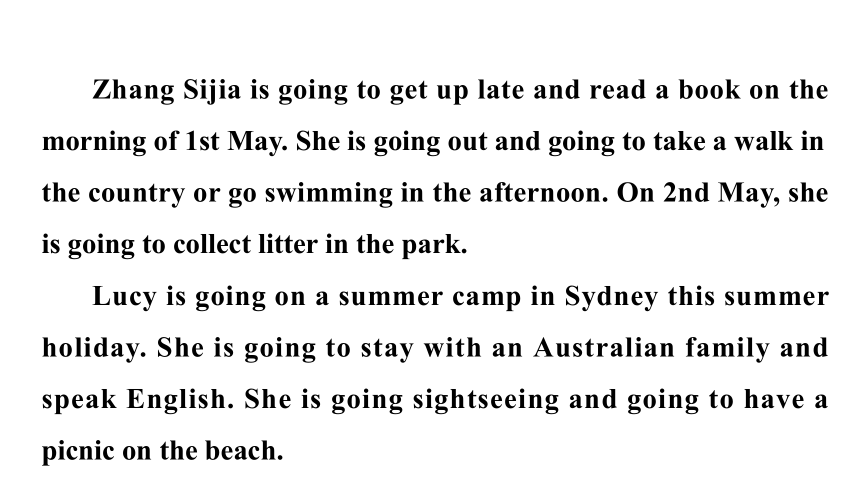

文档简介
(共48张PPT)
Module 3 Making plans
模块知识盘点
常用短语
1. check one’s email 查看邮件
2. go over lessons 复习功课
3. be going to do sth. 打算做某事
4. on Saturday morning 在星期六上午
5. do one’s homework 做作业
6. help with the housework 帮忙做家务
7. see a movie 看电影
8. who else 还有谁
9. have a piano lesson 上一节钢琴课
e with sb. 和某人一起来
11. have a picnic 去野餐
12. would like to do 想做,愿意做
13. join sb. 加入某人
14. plans for ……的计划
15. stay at home alone 独自待在家
16. have a good/fantastic time/enjoy oneself/have fun 玩得开心,过得愉快
17. look forward to 盼望
18. make friends (with sb.) (与某人)交朋友
19. cheer sb. 为某人欢呼
20. win the match 赢得比赛
21. on the morning of 1st May 在5月1日的早上
22. take a walk 去散步
23. spend time 花费时间
24. stay with sb. 与某人待在一起
25. go sightseeing 去观光
26. go on/to a summer camp 去夏令营
27. go for a walk 去散步
经典句型
1. What are you going to do at the weekend, Daming
大明,周末你打算做什么?
2. On Saturday morning, I’m going to check my email and do my homework.
星期六上午,我打算查看我的电子邮件,做我的家庭作业。
3. Who else is going to be there 还有谁打算去呢?
4. —Would you like to join us 你愿意加入我们吗
—Yes, I’d love to. 是的,我很乐意。
5. What are your plans for the weekend
你的周末计划是什么
6. We’re going to meet other fans, and make some new friends.
我们将会见到其他球迷,并结交一些新朋友。
7. I’m going to enjoy myself during the May Day holiday.
我计划在五一假期期间好好玩玩。
8. But on Sunday evening, it’s time for homework!
但是在星期日晚上,该是做家庭作业的时间了!
语法点睛
一般将来时:be going to
1. 用法:表示打算或计划要做的事
2. 句式变化
3. There be 句型的 be going to 结构
4. 特殊疑问句
5. “be going to +地点” 结构
课文再现
Martin is going to watch his favourite football team with his friends tomorrow. They’re going to meet other fans, and make some new friends. They’re all going to wear the team shirt and cheer the players.
Zhang Sijia is going to get up late and read a book on the morning of 1st May. She is going out and going to take a walk in the country or go swimming in the afternoon. On 2nd May, she is going to collect litter in the park.
Lucy is going on a summer camp in Sydney this summer holiday. She is going to stay with an Australian family and speak English. She is going sightseeing and going to have a picnic on the beach.
模块专题聚焦
巧品语法
语法精讲
一般将来时:be going to
命题情报
be going to 结构表达将来时是语法中非常重要的内容,也是历次考试的高频考点。对其考查主要集中在其结构和用法方面。
概念
一般将来时用于描述将来某段时间要发生的动作或存在的状态。
形式
am/is/are going to+动词原形
1 be going to的用法
be going to 是一般将来时态的结构之一。be 动词包括am, is, are,它随着主语的变化而变化。
(1)表示事先经过考虑、安排好打算、计划要做某事。
I am going to take an acting lesson. 我打算上表演课。
She is going to the party. 她打算去参加聚会。
They are going to have a picnic. 他们打算去野餐。
(2)表示根据目前某种迹象判断,某事非常有可能发生,表示推测。
Look! There come the dark clouds. It is going to rain.
瞧!乌云密布。要下雨了。
2 be going to的句式变化
句式
变化
肯定句
否定句
一般疑问句
主语+be going to +动词原形...
主语+be not going to+动词原形...
Be+主语+going to+动词原形...?
肯定答语: Yes, 主语+be.
否定答语: No, 主语+be not.
We are going to visit the museum.
我们打算去参观博物馆。
We’re not going to visit the museum.
我们不打算去参观博物馆。
—Are you going to visit the museum
你们打算去参观博物馆吗?
—Yes, we are. /No, we aren’t.
是的,我们打算去。/不,我们不打算去。
3 There be 句型的be going to 结构
肯定句:There is/are going to be…(常用来表示将有某事发生)
There is going to be a football match in our school next week.
下周我们学校要举行一场足球赛。
否定句:There is/are not going to be...
一般疑问句:Is/Are there going to be...
肯定答语:Yes, there is/are.
否定答语:No, there isn’t/aren’t
4 be going to的特殊疑问句
特殊疑问句的结构是“特殊疑问词+一般疑问句 ”常见的特殊疑问词:
what What are you going to do this weekend?这周末你们打算做什么
when When are you going to have a sports meeting
你们打算什么时候举办运动会
where Where is he going to have his birthday party
他打算在哪里举办他的生日聚会
how How are you going to be a reporter 你打算怎样成为一名记者
how long How long are you going to stay in Beijing 你打算在北京待多长时间
5 “be going to+地点”结构
如果表示“计划去某地”,由于谓语动词go和going重复,一般只说“be going to+地点”。
We are going to Hong Kong next week.
下星期我们打算去香港。
They are going to China for a visit.
他们打算去中国参观。
Ⅰ. 单项选择
1. |柳州中考| What are you going to_______ this evening
A. do B. does C. doing
2. —_______are you going to have the meeting
—In the meeting room on the second floor.
A. What B. When C. Where D. How
考点直击
A
C
3. They _______ a meeting tomorrow afternoon.
A. had B. are going to have
C. has D. have had
4. |白银中考| We _______have a picnic together with our teachers
next Thursday.
A. are going B. are going to
C. will going D. may going to
B
B
5. Is there _______a picnic tomorrow
A. is going to B. is going to be
C. going to be D. going to
C
Ⅱ. 句型转换
1. He is going to write a novel. (改为否定句)
He_______ _______ _______ write a novel.
2. She is going to buy some clothes. (改为一般疑问句)
_______ _______ _______ _______ buy any clothes
isn't going to
Is she going to
3. Is Mary going over her lessons (作肯定回答)
Yes, _______ _______.
4. We are going to have an important meeting this weekend. (对画线部分提问)
_______ _______you going to have an important meeting
she is
When are
Ⅲ. 根据汉语意思翻译句子,注意要使用“be going to”句型
他们打算去游览长城。
_________________________________________
2. 他们不打算去野餐。
_____________________________________
3. 今天晚上那个男孩打算做什么?
_____________________________________
They are going to visit the Great Wall.
They are not going to have a picnic.
What is the boy going to do this evening
如何写好以“计划或安排”为话题的文章
本模块的话题是谈论“计划或安排”,该话题是学生在七年级接触最多的话题之一。在谈论计划或安排时,通常会用到“be going to”句型。现在,就让我们一起结合实例来看看此类文章的写作技巧吧!
妙解写作
写 作 案 例
周末就要到了,每个人都有自己的周末计划。假设你的周末计划如下表所示,请你根据下表中的提示写一篇短文,描述你的周末计划。50—60词。
Saturday morning do homework Sunday morning visit grandparents
Saturday afternoon play soccer Sunday afternoon go skating
素 材 积 累
词汇库
plan 计划 watch 观看 sightseeing 观光 play 玩 visit 游览 busy 忙碌的 interesting 有趣的 match 比赛 weekend 周末 homework 家庭作业
短语箱
be going to do sth. 将要做某事
plan to do sth. 计划做某事 make a plan for... 为……做计划
go swimming/shopping/sightseeing 去游泳/购物/观光
do cleaning/sports/homework/housework 打扫卫生/做运动/做家庭作业/做家务
play football/the piano 踢足球/弹钢琴
have a piano lesson/a picnic/a party 上钢琴课/去野餐/举办聚会
take a walk/a rest 散步/休息
get up early/late 起床早/晚
collect litter 收集垃圾
句式链
① On Sunday morning, I’m/ he’s/she’s/they’re going to ...
在周日早上,我/他/她/他们打算……
② I plan to ...我计划……
③ This is my weekend plan. 这是我的周末计划。
④ I always have a busy weekend. 我总是有一个忙碌的周末。
⑤ There is/are going to be ...这儿将有……
⑥ It’s going to be a fantastic weekend/holiday—busy but great
fun.
这将会是一个极好的周末/假期——忙碌但是很有趣。
五 步 妙 解
审
体裁 记叙文 话题 描述计划或安排
时态 一般将来时 人称 第一人称
段落 布局 开头:引起下文。 主体:周末具体的计划和安排。 结尾:总结语。 遣
I, play soccer, this Saturday afternoon, with my classmates, am going to(.)
连词成句: ___________________________________________________________________
I am going to play soccer with my classmates this Saturday
afternoon.
模
引起
下文
介绍具体的周末
计划
总结语
This is my weekend plan.
My weekend is going to be..., but I think...
On Saturday morning, I’m going to...On Saturday afternoon...
On Sunday morning...On Sunday afternoon...
This is my weekend plan. On Saturday morning, I’m going to do my homework. On Saturday afternoon, I’m going to play soccer with my classmates. On Sunday morning, I’m going to visit my grandparents. On Sunday afternoon, I’m going skating with my friends. My weekend is going to be busy, but I think I will have a good time.
润
点
1. 该文章按表格顺序详细介绍了自己的周末计划,语句通顺,意思连贯。
2. 全文熟练运用了本模块所学的重点句型“be going to+动词原形”;最后一句用连词but进行转折,并且运用短语“have a good time”,为文章增色很多。
小 试 身 手
请你想象一下,你周末打算做什么事情。根据你的实际情况描述一下你的周末计划。
要求:1. 词数:50—60词;2. 可适当发挥想象。 _____________________________________________________
_____________________________________________________
_____________________________________________________
One possible version:
I have a good plan for the weekend.I'm going to visit my grandfather with my parents on Saturday morning.After lunch, I'm going to Lisa's birthday party. That will be a great party.On Sunday morning, I'm going to visit the museum.What about Sunday afternoon Well…I'm going to Children's Hospital to cheer up the sick children. Oh, what a busy weekend!
推测关键词义/句意
这是一种从阅读材料中挑出的单词或短语,并重新解释的题型。这类词语一般具有以下特点:与文章主旨密切相关;语言文字或语法结构上有一定难度,不易理解;在特定上下文中有特殊含义。
解题技巧:
1. 返回原文,结合上下文,理解该词的意思。
培优课堂
2. 搜索时应注意同位语、同义词、反义词、特殊标点、定语从句、上下文之间的逻辑关系、关键提示词以及前后缀,特别注意找出和生词处于同一位置的词去推测。
词义/句意猜测题的命题形式通常为:
1. The word “ ...” in the passage probably means _______.
2. The underlined word “It” in the passage refers to_______.
3. What does the word “ ...” in the sixth paragraph mean in Chinese
4. “... ” in Paragraph 4 means _______.
5. In this passage, the underlined word “ ...” means_______ .
6. The underlined sentence “ ...” in Paragraph 2 means ______.
【典例】
Dear Sunday Globe,
I am writing to tell you about your article Smartphones Make Life Easier in last Sunday’s newspaper. You did an excellent job explaining the good points of smartphones, but you didn’t talk about their bad points at all. So, I hope you’ll let me give your readers some advice on smartphone etiquette(礼仪).
The first point I’d like to address is loudness. When you talk on your smartphone in public, please don’t shout. In fact, the microphones in smartphones are very sensitive(灵敏的). So, you can be heard even if you speak quietly.
....
【题目】 What does the underlined word “address” in Paragraph 2 probably mean
A. 致函 B. 称呼 C. 陈述 D. 选址
【答案】 C
【解析】从第二段开始,信中谈论即陈述了使用智能手机的建议。由此推知选C。
谢 谢 观 看!
Module 3 Making plans
模块知识盘点
常用短语
1. check one’s email 查看邮件
2. go over lessons 复习功课
3. be going to do sth. 打算做某事
4. on Saturday morning 在星期六上午
5. do one’s homework 做作业
6. help with the housework 帮忙做家务
7. see a movie 看电影
8. who else 还有谁
9. have a piano lesson 上一节钢琴课
e with sb. 和某人一起来
11. have a picnic 去野餐
12. would like to do 想做,愿意做
13. join sb. 加入某人
14. plans for ……的计划
15. stay at home alone 独自待在家
16. have a good/fantastic time/enjoy oneself/have fun 玩得开心,过得愉快
17. look forward to 盼望
18. make friends (with sb.) (与某人)交朋友
19. cheer sb. 为某人欢呼
20. win the match 赢得比赛
21. on the morning of 1st May 在5月1日的早上
22. take a walk 去散步
23. spend time 花费时间
24. stay with sb. 与某人待在一起
25. go sightseeing 去观光
26. go on/to a summer camp 去夏令营
27. go for a walk 去散步
经典句型
1. What are you going to do at the weekend, Daming
大明,周末你打算做什么?
2. On Saturday morning, I’m going to check my email and do my homework.
星期六上午,我打算查看我的电子邮件,做我的家庭作业。
3. Who else is going to be there 还有谁打算去呢?
4. —Would you like to join us 你愿意加入我们吗
—Yes, I’d love to. 是的,我很乐意。
5. What are your plans for the weekend
你的周末计划是什么
6. We’re going to meet other fans, and make some new friends.
我们将会见到其他球迷,并结交一些新朋友。
7. I’m going to enjoy myself during the May Day holiday.
我计划在五一假期期间好好玩玩。
8. But on Sunday evening, it’s time for homework!
但是在星期日晚上,该是做家庭作业的时间了!
语法点睛
一般将来时:be going to
1. 用法:表示打算或计划要做的事
2. 句式变化
3. There be 句型的 be going to 结构
4. 特殊疑问句
5. “be going to +地点” 结构
课文再现
Martin is going to watch his favourite football team with his friends tomorrow. They’re going to meet other fans, and make some new friends. They’re all going to wear the team shirt and cheer the players.
Zhang Sijia is going to get up late and read a book on the morning of 1st May. She is going out and going to take a walk in the country or go swimming in the afternoon. On 2nd May, she is going to collect litter in the park.
Lucy is going on a summer camp in Sydney this summer holiday. She is going to stay with an Australian family and speak English. She is going sightseeing and going to have a picnic on the beach.
模块专题聚焦
巧品语法
语法精讲
一般将来时:be going to
命题情报
be going to 结构表达将来时是语法中非常重要的内容,也是历次考试的高频考点。对其考查主要集中在其结构和用法方面。
概念
一般将来时用于描述将来某段时间要发生的动作或存在的状态。
形式
am/is/are going to+动词原形
1 be going to的用法
be going to 是一般将来时态的结构之一。be 动词包括am, is, are,它随着主语的变化而变化。
(1)表示事先经过考虑、安排好打算、计划要做某事。
I am going to take an acting lesson. 我打算上表演课。
She is going to the party. 她打算去参加聚会。
They are going to have a picnic. 他们打算去野餐。
(2)表示根据目前某种迹象判断,某事非常有可能发生,表示推测。
Look! There come the dark clouds. It is going to rain.
瞧!乌云密布。要下雨了。
2 be going to的句式变化
句式
变化
肯定句
否定句
一般疑问句
主语+be going to +动词原形...
主语+be not going to+动词原形...
Be+主语+going to+动词原形...?
肯定答语: Yes, 主语+be.
否定答语: No, 主语+be not.
We are going to visit the museum.
我们打算去参观博物馆。
We’re not going to visit the museum.
我们不打算去参观博物馆。
—Are you going to visit the museum
你们打算去参观博物馆吗?
—Yes, we are. /No, we aren’t.
是的,我们打算去。/不,我们不打算去。
3 There be 句型的be going to 结构
肯定句:There is/are going to be…(常用来表示将有某事发生)
There is going to be a football match in our school next week.
下周我们学校要举行一场足球赛。
否定句:There is/are not going to be...
一般疑问句:Is/Are there going to be...
肯定答语:Yes, there is/are.
否定答语:No, there isn’t/aren’t
4 be going to的特殊疑问句
特殊疑问句的结构是“特殊疑问词+一般疑问句 ”常见的特殊疑问词:
what What are you going to do this weekend?这周末你们打算做什么
when When are you going to have a sports meeting
你们打算什么时候举办运动会
where Where is he going to have his birthday party
他打算在哪里举办他的生日聚会
how How are you going to be a reporter 你打算怎样成为一名记者
how long How long are you going to stay in Beijing 你打算在北京待多长时间
5 “be going to+地点”结构
如果表示“计划去某地”,由于谓语动词go和going重复,一般只说“be going to+地点”。
We are going to Hong Kong next week.
下星期我们打算去香港。
They are going to China for a visit.
他们打算去中国参观。
Ⅰ. 单项选择
1. |柳州中考| What are you going to_______ this evening
A. do B. does C. doing
2. —_______are you going to have the meeting
—In the meeting room on the second floor.
A. What B. When C. Where D. How
考点直击
A
C
3. They _______ a meeting tomorrow afternoon.
A. had B. are going to have
C. has D. have had
4. |白银中考| We _______have a picnic together with our teachers
next Thursday.
A. are going B. are going to
C. will going D. may going to
B
B
5. Is there _______a picnic tomorrow
A. is going to B. is going to be
C. going to be D. going to
C
Ⅱ. 句型转换
1. He is going to write a novel. (改为否定句)
He_______ _______ _______ write a novel.
2. She is going to buy some clothes. (改为一般疑问句)
_______ _______ _______ _______ buy any clothes
isn't going to
Is she going to
3. Is Mary going over her lessons (作肯定回答)
Yes, _______ _______.
4. We are going to have an important meeting this weekend. (对画线部分提问)
_______ _______you going to have an important meeting
she is
When are
Ⅲ. 根据汉语意思翻译句子,注意要使用“be going to”句型
他们打算去游览长城。
_________________________________________
2. 他们不打算去野餐。
_____________________________________
3. 今天晚上那个男孩打算做什么?
_____________________________________
They are going to visit the Great Wall.
They are not going to have a picnic.
What is the boy going to do this evening
如何写好以“计划或安排”为话题的文章
本模块的话题是谈论“计划或安排”,该话题是学生在七年级接触最多的话题之一。在谈论计划或安排时,通常会用到“be going to”句型。现在,就让我们一起结合实例来看看此类文章的写作技巧吧!
妙解写作
写 作 案 例
周末就要到了,每个人都有自己的周末计划。假设你的周末计划如下表所示,请你根据下表中的提示写一篇短文,描述你的周末计划。50—60词。
Saturday morning do homework Sunday morning visit grandparents
Saturday afternoon play soccer Sunday afternoon go skating
素 材 积 累
词汇库
plan 计划 watch 观看 sightseeing 观光 play 玩 visit 游览 busy 忙碌的 interesting 有趣的 match 比赛 weekend 周末 homework 家庭作业
短语箱
be going to do sth. 将要做某事
plan to do sth. 计划做某事 make a plan for... 为……做计划
go swimming/shopping/sightseeing 去游泳/购物/观光
do cleaning/sports/homework/housework 打扫卫生/做运动/做家庭作业/做家务
play football/the piano 踢足球/弹钢琴
have a piano lesson/a picnic/a party 上钢琴课/去野餐/举办聚会
take a walk/a rest 散步/休息
get up early/late 起床早/晚
collect litter 收集垃圾
句式链
① On Sunday morning, I’m/ he’s/she’s/they’re going to ...
在周日早上,我/他/她/他们打算……
② I plan to ...我计划……
③ This is my weekend plan. 这是我的周末计划。
④ I always have a busy weekend. 我总是有一个忙碌的周末。
⑤ There is/are going to be ...这儿将有……
⑥ It’s going to be a fantastic weekend/holiday—busy but great
fun.
这将会是一个极好的周末/假期——忙碌但是很有趣。
五 步 妙 解
审
体裁 记叙文 话题 描述计划或安排
时态 一般将来时 人称 第一人称
段落 布局 开头:引起下文。 主体:周末具体的计划和安排。 结尾:总结语。 遣
I, play soccer, this Saturday afternoon, with my classmates, am going to(.)
连词成句: ___________________________________________________________________
I am going to play soccer with my classmates this Saturday
afternoon.
模
引起
下文
介绍具体的周末
计划
总结语
This is my weekend plan.
My weekend is going to be..., but I think...
On Saturday morning, I’m going to...On Saturday afternoon...
On Sunday morning...On Sunday afternoon...
This is my weekend plan. On Saturday morning, I’m going to do my homework. On Saturday afternoon, I’m going to play soccer with my classmates. On Sunday morning, I’m going to visit my grandparents. On Sunday afternoon, I’m going skating with my friends. My weekend is going to be busy, but I think I will have a good time.
润
点
1. 该文章按表格顺序详细介绍了自己的周末计划,语句通顺,意思连贯。
2. 全文熟练运用了本模块所学的重点句型“be going to+动词原形”;最后一句用连词but进行转折,并且运用短语“have a good time”,为文章增色很多。
小 试 身 手
请你想象一下,你周末打算做什么事情。根据你的实际情况描述一下你的周末计划。
要求:1. 词数:50—60词;2. 可适当发挥想象。 _____________________________________________________
_____________________________________________________
_____________________________________________________
One possible version:
I have a good plan for the weekend.I'm going to visit my grandfather with my parents on Saturday morning.After lunch, I'm going to Lisa's birthday party. That will be a great party.On Sunday morning, I'm going to visit the museum.What about Sunday afternoon Well…I'm going to Children's Hospital to cheer up the sick children. Oh, what a busy weekend!
推测关键词义/句意
这是一种从阅读材料中挑出的单词或短语,并重新解释的题型。这类词语一般具有以下特点:与文章主旨密切相关;语言文字或语法结构上有一定难度,不易理解;在特定上下文中有特殊含义。
解题技巧:
1. 返回原文,结合上下文,理解该词的意思。
培优课堂
2. 搜索时应注意同位语、同义词、反义词、特殊标点、定语从句、上下文之间的逻辑关系、关键提示词以及前后缀,特别注意找出和生词处于同一位置的词去推测。
词义/句意猜测题的命题形式通常为:
1. The word “ ...” in the passage probably means _______.
2. The underlined word “It” in the passage refers to_______.
3. What does the word “ ...” in the sixth paragraph mean in Chinese
4. “... ” in Paragraph 4 means _______.
5. In this passage, the underlined word “ ...” means_______ .
6. The underlined sentence “ ...” in Paragraph 2 means ______.
【典例】
Dear Sunday Globe,
I am writing to tell you about your article Smartphones Make Life Easier in last Sunday’s newspaper. You did an excellent job explaining the good points of smartphones, but you didn’t talk about their bad points at all. So, I hope you’ll let me give your readers some advice on smartphone etiquette(礼仪).
The first point I’d like to address is loudness. When you talk on your smartphone in public, please don’t shout. In fact, the microphones in smartphones are very sensitive(灵敏的). So, you can be heard even if you speak quietly.
....
【题目】 What does the underlined word “address” in Paragraph 2 probably mean
A. 致函 B. 称呼 C. 陈述 D. 选址
【答案】 C
【解析】从第二段开始,信中谈论即陈述了使用智能手机的建议。由此推知选C。
谢 谢 观 看!
同课章节目录
- Module 1 Lost and found
- Unit 1 Whose bag is this?
- Unit 2 Are they yours?
- Unit 3 Language in use
- Module 2 What can you do ?
- Unit 1 I can play the piano
- Unit 2 I can run really fast
- Unit 3 Language in use
- Module 3 Making plans
- Unit 1 What are you going to do at the weekends?
- Unit 2 We're going to cheer the players.
- Unit 3 Language in use
- Module 4 Life in the future
- Unit 1 Everyone will study at home
- Unit 2 Every family will have a small plane.
- Unit 3 Language in use
- Module 5 Shopping
- Unit 1 What can I do for you?
- Unit 2 You can buy everything on the Internet
- Unit 3 Language in use
- Module 6 Around town
- Unit 1 Could you tell me how to get to the Nationa
- Unit 2 The London Eye is on your right.
- Unit 3 Language in use
- Revision module A
- Module 7 My past life
- Unit 1 I was born in a small village.
- Unit 2 I was born in Quincy.
- Unit 3 Language in use
- Module 8 Story time
- Unit 1 Once upon a time….
- Unit 2 Goldilocks hurried out of the house.
- Unit 3 Language in use
- Module 9 Life history
- Unit 1 He left school and began work at the age of
- Unit 2 He decided to be an actor.
- Unit 3 Language in use
- Module 10 A holiday journey
- Unit 1 What did you do?
- Unit 2 This morning we took a walk.
- Unit 3 Language in use
- Module 11 Body language
- Unit 1 They touch noses!
- Unit 2 Here are some ways to welcome them.
- Unit 3 Language in use
- Module 12 Western music
- Unit 1 It's so beautiful!
- Unit 2 Vienna is the centre of European classical
- Unit 3 Language in use
- Revision module B
